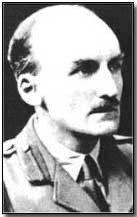Acts 8:26-39
Bible Class Audio: God’s Will and Purpose Revisited
And this is the will of him who sent me, that I shall lose none of all those he has given me, but raise them up at the last day. For my Father’s will is that everyone who looks to the Son and believes in him shall have eternal life, and I will raise them up at the last day.” (John 6:39, 40 NIV)
It’s Critical to Think Critically
Lessons from the U.S. Army War College:
God created in us the ability to think, reason, and decide (free will). As we grow from infant to adolescent that ability both matures but never reaches our full potential. Our reasoning naturally narrows as our point of view is informed by our culture, religion, and parents to name just a few. Maturity brings complex problems which requires reasoning outside of our point of view. However, few recognize their point of view has been narrowed by their personal biases and in informed assumptions. To move beyond narrow thinking one must deliberately Learn and practice critical thinking.
 First of all, not all problems require critical thinking. In fact most decisions are automatic (should I wear my seat belt) or are a choice between few choices. However, when problems are complex, have huge implications, or you realize strong personal views might lead to a poor decision then critical thinking should be used.
First of all, not all problems require critical thinking. In fact most decisions are automatic (should I wear my seat belt) or are a choice between few choices. However, when problems are complex, have huge implications, or you realize strong personal views might lead to a poor decision then critical thinking should be used.
We need to first define the problem. If I had one hour to save the world, I would spend 59 minutes defining the problem and one minute finding solutions. Dr. Albert Einstein
Learn to Learn and Think On Your Own
Lessons from the U.S. Army War College:
Rote learning is good for beginning learning on basic academic subjects, but rote learning fails with time and increased complexity of problem. There comes a time in every life when a person must learn to think critically and explore new ideas without the goading of a teacher, boss, or test. The person who fails to achieve this state is destined to struggle when the inevitable wicked problems of life and occupation arise.
“During your course here no one is going to compel you to work, for the simple reason that a man who requires to be driven is not worth the driving…Thus you will become your own students and until you learn how to teach yourselves, you will never be taught by others.” Major General J. F. C. Fuller
Danger Opportunity
“ . . . the Chinese symbol for crisis is the merging of two signs, one meaning ‘danger’ and the other meaning ‘opportunity.’ A crisis has the potential to transform or destroy. And what is the tipping point toward transformation in the face of crisis? The choice is either to cower in fear or to step forward with courage.”
— Dr. Dan B. Allender, American author, educator, therapist
Wisdom vs Rules
At work I am often urged to write policy letters to cover every possible contingency of human behavior. These policy letters are reviewed by lawyers to ensure every lawsuit is avoided, operations officers look for the impetuous for action, the employees immediately look for a loop hole which, when found, prompts more policy letters. ENOUGH! You can’t write a standard operating procedure for common sense.
A presentation by Barry Swartz at the TED conference struck a cord with me. In it, Dr. Swartz describes practical wisdom as defined by Aristotle as the “combination of moral will and moral skill.”
This message should ring true to Christians. Sadly, in many Christian religious traditions the basis for their beliefs is rooted in commandments and rules instead of the spirit of Christ. Colossian 2:20-23 reads:
Since you died with Christ to the basic principles of this world, why, as though you still belonged to it, do you submit to its rules: “Do not handle! Do not taste! Do not touch!”? These are all destined to perish with use, because they are based on human commands and teachings. Such regulations indeed have an appearance of wisdom, with their self-imposed worship, their false humility and their harsh treatment of the body, but they lack any value in restraining sensual indulgence. (NIV)
The church on Colossi was struggling with Gnosticism manifesting in part as a form of Jewish legalism to which Paul reminds them of the internal nature of Christ. In Jeremiah it was prophesied that when Christ comes the laws will be written on our minds and hearts.
“This is the covenant I will make with the house of Israel
after that time,” declares the LORD.
“I will put my law in their minds
and write it on their hearts.
I will be their God,
and they will be my people. (Jeremiah, NIV)”
God’s plan for us is to live with wisdom within the context of His will. Even the Bible, as perfect as it is, can not regulate every action of the human mind. My children are fond of justifying their actions by the phrase, “but the Bible doesn’t specifically say we can’t….”
That’s why Paul’s message and prayer to the church in Colossi was that “… we have not stopped praying for you and asking God to fill you with the knowledge of his will through all spiritual wisdom and understanding. (NIV, Colossians 1:9)”
Practical Christian wisdom is a combination of Spiritual will and Biblical skill. As Christians we must continue to study the scriptures and let the spirit of God take control of our lives. Choosing a life filled with the Spirit instead emptied by sets of rules
James 3
Who is wise and understanding among you? Let him show it by his good life, by deeds done in the humility that comes from wisdom. But if you harbor bitter envy and selfish ambition in your hearts, do not boast about it or deny the truth. Such “wisdom” does not come down from heaven but is earthly, unspiritual, of the devil. For where you have envy and selfish ambition, there you find disorder and every evil practice.
But the wisdom that comes from heaven is first of all pure; then peace-loving, considerate, submissive, full of mercy and good fruit, impartial and sincere. Peacemakers who sow in peace raise a harvest of righteousness.
Proverbs 10:13-14
Wisdom is found on the lips of the discerning,
but a rod is for the back of him who lacks judgment.
Wise men store up knowledge,
but the mouth of a fool invites ruin.
“Your credibility suffers when you rely on rules and policies instead of being flexible enough to help others solve problems. It’s easy to say, ‘That’s against the rules!’. It’s better to say, ‘Let’s identify the problem and see if there is a way to solve it.’ People trust problem-solvers.” Sandy Allgeier, “Can You Be Trusted?, “ Personal Excellence, June 2009
Power of Happiness
Each morning when I open my eyes I say to myself: I, not events, have the power to make me happy or unhappy today. I can choose which it shall be. Yesterday is dead, tomorrow hasn’t arrived yet. I have just one day, today, and I’m going to be happy in it.” – Julius Henry “Groucho” Marx, 1890-1977, American comedian and film star
You May Be A Prophet
If you keep on saying things are going to be bad, you have a good chance of being a prophet.
Isaac Bashevis Singer, 1905-1991, Polish-American author
Character Casts Reputation
Don’t confuse character with reputation. Abraham Lincoln said, ‘Character is like a tree and reputation like its shadow. The shadow is what we think of it; the tree is the real thing.’ Some people spend too much time worrying about the shadow and too little about the tree. Reputation is fragile; character endures.
Good character is ethics in action; it’s the ability to summon the moral strength to do the right thing even when it may cost more than we want to pay.
People of character do the right thing even if no one is looking; they live up to their values even when there is no advantage to do so.
Finally, no one is born with good character. It’s something we all have to build and protect day by day, decision by decision.”
– Michael Josephson
No Man is Always Right
“Loneliness is the inescapable lot of a man holding such a job. Subordinates can advise, urge, help, and pray – but only one man in his own mind and heart can decide, “Do we or do we not?” The stakes are always high, and the penalties are expressed in terms of loss of life or major or minor disasters to the nation. No man can always be right. So the struggle is to do one’s best, to keep the brain and conscience clear; never to be swayed by unworthy motives or inconsequential reasons, but…to do one’s duty. It is not always easy.”
– Dwight D. Eisenhower to his wife Mamie February 15, 1943.

